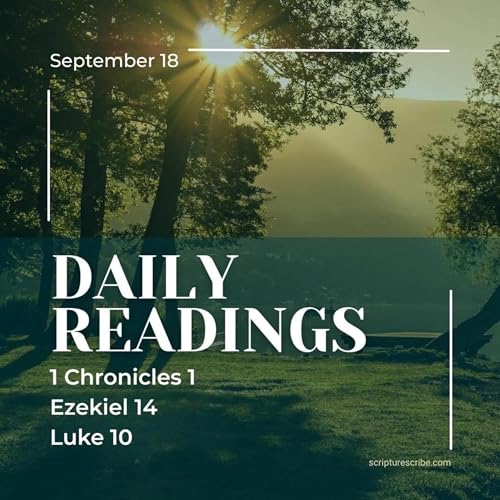
Thoughts on the Bible Readings September 18th (1 Chronicles 1; Ezekiel 14; Luke 10)
カートのアイテムが多すぎます
カートに追加できませんでした。
ウィッシュリストに追加できませんでした。
ほしい物リストの削除に失敗しました。
ポッドキャストのフォローに失敗しました
ポッドキャストのフォロー解除に失敗しました
-
ナレーター:
-
著者:
このコンテンツについて
The books of Chronicles were believed to have been written by Ezra to outline what was needing to be done by the returning exiles to be Yahweh's faithful people. Chapter 1 of 1 Chronicles records the genealogy of Adam through to Abraham and his descendants. The chapter concludes with the twelve dukedoms of Esau. These were in force for hundreds of years before the monarchy in Israel. Chronicles focuses on the positive rulers who after difficult years sought to spiritually revive the kingdom of Judah. We saw in the two books of Kings that all of the rulers of the northern kingdom of Israel were wicked. Judah's fortunes fluctuated with the occasional great reformer, although the general direction of the
kingdom was a downward spiral. By heeding the lessons learned from both books of Kings and from both books of Chronicles hopefully the returning exiles would return from idolatry to a pure and God-fearing community. History tells us that those who returned from the Babylonian captivity never again turned to idolatry. Ezekiel 14 tells us of the idolatry of Judah. God would not spare His judgments on Jerusalem. What an incredible state of affairs it was when three of the greatest intercessors for the nation to that point in history could not meditate on behalf of the kingdom - Noah, Job and Daniel. Though these three men, had the LORD raised them up at that time, should seek pardon for the nation from the Almighty it would have been in vain. Judah's Sovereign would send four disastrous acts of judgment on Jerusalem - sword, famine, wild beasts and pestilence. Luke 10 says that the Lord Jesus appoints seventy emissaries to spread the gospel message. These men were sent out two by two so as to support each other. Although they carry the message only within the confines of the land it was symbolic of the Gospel being taken to all the nations from Israel (compare Genesis 10; and Deuteronomy 32 verses 8). Once again, these ambassadors were to take the minimum of provisions and to rely on faithful help. Any person scorning them would bare their condemnation. Three such Galilean cities are named and their inexcusable behaviour catalogued. The seventy returned to Jesus with triumphant tales. Christ indicates that their reports were a token of the triumph of Christ's kingdom over those of this world (compare with Revelation 11 verses 15). The Lord then reveals that the Father's will can only be understood by those receiving the kingdom message with a child-like trust. Let us take great heed to that lesson. The parable of the Good Samaritan, which is unique in Luke, portrays the perils and pitiful attitudes of those who should have understood their role among God's people. Instead, it is the Samaritan, whose care was evident for the man who had fallen among thieves. Jesus is the Samaritan of the parable, and he will recompense those who have taken care of the Father's people. The oil and wine was the healing balm of the Gospel message. The chapter concludes with a disagreement between Martha and Mary about what is most necessary. Both the roles of these two sisters are essential, but the most important of all is to sit at our Lord's feet and to learn from Jesus.
Thanks for joining us - we pray you found these comments helpful in your appreciation of God's words, join again tomorrow



